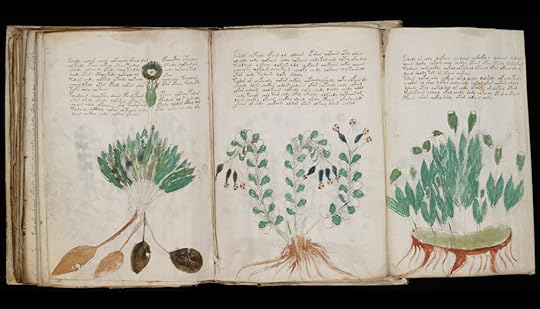God is Unconscious: A New Book by Tad Delay

My friend Tad Delay has just published a great book called God is Unconscious that explores Lacan’s psychoanalytic work in relation to theology. For those interested in the intersection of psychoanalysis and theology, or with understanding more about my own use of Lacan, I’d warmly recommend the book. Indeed I liked it so much I write the forward to it, which I’ve reprinted here
In 1912 a Polish book dealer named Wilfred Voynich purchased a mysterious manuscript thought to have been composed in Northern Italy during the Italian Renaissance. The manuscript itself was an obscure, esoteric script composed of approximately 35,000 “words,” spread over 240 pages that comprised six sections.
What gave the document its mesmerizing appeal was quite simple: it was a carefully crafted text full of illustrations that no one could understand.
The Latin-esque markings appeared to obey a crude grammar and syntax, yet these seeming signifiers roamed free, defying any stable link to a signified. The Voynich manuscript, as it became known, quickly established itself as one of the most interesting enigmas in cryptography, with experts discussing whether the author was a cryptographer, charlatan, outsider artist, mystic channeling glossolalia, or some poor scholar suffering from a brain trauma.
Like Hopelandic, the invented “language” of Icelandic band Sigur Rós, The Voynich Manuscript easily evokes a feeling of meaning, yet this meaning is frustratingly experienced as simultaneously eroded. Something seems to be said, yet this said remains too ethereal to grasp.
Reading Lacan can often evoke the same feeling one gets when encountering The Voynich Manuscript, and similar claims have been made about the former as those concerning the author of the latter. Alan Sokal, for example, claimed that Lacan’s use of science is utterly nonsensical, while Noam Chomsky has referred to him as a self aware charlatan. For some Lacan is dismissed a master huckster blessed with a gift that enables him to fool some of the smartest people in the room, while for others he’s hailed as an indispensable guide for those grappling with the complexity of human subjectivity and the ideological systems which this subjectivity invents/inhabits.
Yet, just like The Voynich Manuscript, Lacan’s work has, in its resistance to easy interpretation or reduction to a University Discourse, generated a significant industry of academic production. His work continues to have a profound impact in critical theory, and has been put to use in all manner of fields from literary studies, feminism, and film theory, to jurisprudence, linguistics, and philosophy. His teachings have not only been productive in generating new concepts and distinctions, but has provided ways of challenging the very frame these disciples use to approach their respective areas of inquiry. The harvest produced by his work is thus found well beyond the field of psychoanalytic practice it was cultivated in. Even for those who wonder whether Lacan’s work is meaningful, it cannot be denied that the work is ripe for meaning making.
One of the disciplines that one would expect to have been impacted by the industrious work of Lacanians is that of theology, if for no other reason that Lacan himself often used theological references, quoted theological thinkers, and commented upon a link between the Protestant Reformation and the psychoanalytic revolution. Yet this has, with a few exceptions, not been reflected in the literature.
This situation has been changing in recent years with a new generation of thinkers – partly inspired by Žižek’s theological investigations – reflecting on Lacan’s corpus with religion in mind. With God is Unconscious Tad DeLay has boldly entered this fray with an important contribution that offers clear co-ordinates with which to navigate the landscape of Lacan’s teaching while also preserving his unique voice.
Providing clarity while maintaining Lacan’s voice is no easy accomplishment. To err on one side risks turning Lacan’s writing into a series of hackneyed sayings, while erring on the other runs the danger of providing a map as baffling as the landscape it outlines.
DeLay avoids these pitfalls by providing a brilliant overview of Lacan’s work that is disrupted by a wealth of quotes. These quotes are not domesticated by his interpretations, but are set alongside his reflections to challenge, deepen, and enrich them.
DeLay provides the reader with a powerful overview for those standing on the threshold of Lacan (which includes those who have read him many times before), but he also puts Lacan’s corpus to theological work. More than this he demonstrates how Lacan’s teaching impacts the work of theology. This is not a book that mines Lacan’s text for explicit theological references or themes, rather it shows how Lacan’s overall project disrupts, deepens, and challenges the very field of theological inquiry. DeLay takes seriously Lacan’s claim that psychoanalysis and theology are closely linked and draws this out in ways that are clarifying and fruitful.
DeLay has spent years with Lacan’s teachings. He has sat with them, worked through them, and let them speak into him. The fruit of that labour is what you hold in your hands, an insightful and fertile text that will prove invaluable for those who wish to grapple with Lacan seriously and theologically.
Those who have spent years traversing Lacan’s texts will tell you that endurance is required. It’s hard to avoid periods of frustration while reading Écrits or confronting confusion when working through the Seminar. Yet countless people have found their labors rewarded by points of clarity, insight, and productive association. Which brings us to a second requirement: guides to help encourage you and draw your attention to what might otherwise be missed. In God is Unconscious DeLay proves to be such a guide. He doesn’t do all the work for us, masticating the food so that we might swallow it without the effort or the taste, but instead he helps make the formidable material more palatable so that we might experience how nourishing it really is.
Peter Rollins's Blog
- Peter Rollins's profile
- 314 followers



